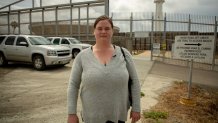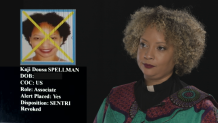The American Civil Liberties Union (ACLU) has filed a lawsuit against the Trump administration for secretly recording and tracking the movements of humanitarians, journalists, and others crossing the U.S./Mexico border.
The ACLU and an outside legal firm filed the lawsuit Tuesday, July 23, in U.S. District Court in Los Angeles on behalf of three humanitarian workers.
“To the Trump administration, compassion is a crime,” said Mohammad Tajsar, an attorney with the ACLU in Southern California. “Not content to shut the country’s doors to vulnerable families seeking refuge, the government launched a secret spying program to punish lawyers and activists who dared to provide for the basic welfare of migrants wanting a better life for themselves and their loved ones.”
NBC 7 Investigates broke the story of the secret database in March after obtaining leaked documents from an anonymous source inside the Department of Homeland Security. The documents revealed government agents created a database of attorneys, activists, journalists, and social media influencers who were affiliated with or covering the 2018 surge of thousands of migrants traveling from Central America to the U.S to seek asylum.
The database, gathered under the government’s response to the migrant caravan known as “Operation Secure Line,” included screenshots of ten journalists, three attorneys, and 46 others who the agents classified as organizers, or instigators associated with the caravan.
The list also included members of organizations such as Border Angels, Pueblo Sin Fronteras, and Al Otro Lado.
Local
PHOTOS: Leaked Documents Show Government Tracking Journalists, Immigration Advocates
In addition to tracking the movements of those on the list, the documents showed agents also placed alerts on people’s passports, preventing some from entering Mexico for work.
The plaintiffs in the legal challenge include documentary filmmaker and border shelter volunteer, Nathaniel Dennison, as well as Nora Phillips and Erika Pinheiro, the co-founders of the nonprofit, Al Otro Lado, which provides legal and mental health services to immigrants.
In May, NBC 7 interviewed Phillips in May after she held a staff meeting through the border fence at Friendship Park on the border. Customs and Border Protection Agents detained Phillips last year while returning to the U.S from Mexico. Because of health concerns and fear of another detainment, Phillips has avoided crossing since.
“I can’t be detained again,” Phillips told NBC 7 from the border wall in San Diego. “I have a very serious medical condition.”

Phillips told NBC 7 that things started to make sense after learning about the secret database.
“It was actually very validating. When I was detained both governments, Mexico and the United States, denied that they had done anything. When [NBC 7 reported on the list] we felt so validated. We finally had proof of what we knew for a very long time.”
In a July 23 news release, representatives from the ACLU credit NBC 7 for uncovering the database. Attorneys involved in the litigation consider the dossier to be a challenge to citizen’s constitutional rights.
“This case presents important questions about our citizens’ First Amendment rights as guaranteed under the Constitution,” said R. Alexander Pilmer, an attorney at Kirkland & Ellis who are co-counsel for the lawsuit. “We look forward to a court protecting these rights.”
But the ACLU’s challenge is not the only one filed against the federal government for the surveillance program.
Earlier this month, a Christian minister filed a lawsuit after she was listed as a target of the surveillance program.
Pastor Kaji Dousa sued the Department of Homeland Security for interfering with her constitutional right to counsel and assist members of the migrant caravan.
“I believe it's a political hit list and they're trying to use me as a broad example,” Dousa told NBC 7. “I think they're trying to intimidate us because we're dissidents and we're being critical of what we believe to be evil.”

In late-2018, Dousa had traveled to Tijuana to provide counseling and lead prayers with asylum seekers. Dousa even officiated a wedding.
But when Dousa tried to return to the U.S. on January 2, 2019, her passport signaled border agents to escort her to a back room, where she said she waited for hours.
Dousa’s attorneys argue that border agents violated Dousa’s First Amendment rights by tracking her religious activities.
NBC 7 and the Reporters Committee for Freedom of the Press have also filed a lawsuit against the Department of Homeland Security over the agency’s denial to release records pertaining to the creation of the database. The records were requested under the Freedom of Information Act.
NBC 7 reached out to the U.S. Customs and Border Protection (CBP) as well as the Department of Homeland Security for a comment regarding the lawsuit. A spokesperson for CBP said the agency does not comment on pending litigation.
In the past, the border agencies have called the surveillance tactics “standard law enforcement practice,” and added that everyone listed in the database was a witness to violent acts on border agents or were suspected of breaking the law.
NBC 7 Investigates broke this story back in March and continues to uncover more about the border surveillance program. To read the team’s series of stories, titled “Tracked By The Government,” click here.



